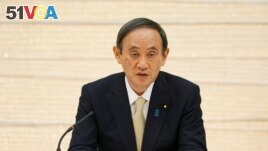12 May 2021
Japan's government is facing criticism for pressing its plans to hold the Tokyo Olympics even as the country deals with the coronavirus health crisis.
More than 300,000 people have signed a petition calling for a cancellation of the Games, which are set to open on July 23. The 2020 Summer Olympics were delayed because of the coronavirus pandemic.
A Japanese newspaper advertisement said people were in danger of being "killed by politics." It suggested the government is not doing enough to fight the pandemic and vaccines are not widely available.
Prime Minister Yoshihide Suga has repeatedly stated that the government is continuing with plans to hold the Olympics. He has promised that the games will happen safely and securely. Some Japanese lawmakers have questioned those statements as some hospitals still struggle to find beds for those sick with COVID-19. On Wednesday, officials in some parts of Japan extended a state of emergency as virus cases continued to rise.
Last month, Suga declared a third state of emergency in Osaka, the center of the current rise in virus cases, as well as in Tokyo and two other areas. That has since been extended through May 31. On Wednesday, two more areas, Aichi in central Japan and Fukuoka in the south, were placed under emergency measures.

In this April 23, 2021, file photo, Japanese Prime Minister Yoshihide Suga speaks in a meeting to declare a state of emergency for Tokyo and three other prefectures at the prime minister's office in Tokyo. (AP Photo/Eugene Hoshiko, Pool, File)
It is estimated that only 1 percent of the Japanese public has so far been fully vaccinated although millions of vaccine doses sit unused in very low temperature storage.
The newspaper ad stated: "No vaccine. No medication. Are we supposed to fight with bamboo spears? We'll be killed by politics if things remain unchanged."
The ad was created by Tokyo-based publisher Takarajimasha. The company is known for speaking out on political and social issues. It urged the public to demand that the government end poorly planned coronavirus measures. "We have been deceived. What was the past year for?" it said.
The ad brought a lot of attention on social media. It said many Japanese have faced medical and financial problems with little government support.
But there was also wide public interest in a parliament meeting in which numerous opposition lawmakers questioned Suga. People want to know how he could guarantee a safe Olympics during an expanded state of emergency. Suga avoided giving a direct answer, saying repeatedly that he was committed to holding the games safely and to protecting people's lives and health.
Videos of Suga's comments were shared widely on social media, with some people posting critical statements such as "The prime minister is broken."
Suga and his government have faced criticism for being too slow and soft on virus measures. Japan has been able to keep its number of virus cases and deaths below those in the U.S. and Europe without lockdowns and other restrictive measures. But the results are worse than in some other parts of Asia.
Japan has also fallen far behind in vaccinations. Though officials blame a lack of supplies imported from Europe, progress has been slowed because of staff shortages. About 7.6 million doses, or more than half of all shots received, remain unused in freezers.
The president of the Tokyo Olympic organizing committee, Seiko Hashimoto, said Wednesday that Japanese athletes were likely to get vaccines before the games begin. "In the case of Japan, the vaccination of the citizens isn't going very well," she said. "Not much progress is being made."
Hashimoto added that because this is seen by the public as giving Olympic athletes special treatment, "this gives rise to dissatisfaction among the citizens toward the games."
I'm Bryan Lynn.
The Associated Press reported on this story. Bryan Lynn adapted the report for VOA Learning English. Mario Ritter, Jr. was the editor.
We want to hear from you. Write to us in the Comments section, and visit 51VOA.COM.
_________________________________________________
Words in This Story
petition – n. a document signed by a large number of people demanding some form of action from the government
dose – n. the amount of a medicine, drug, or vitamin that is taken at one time
spear – n. a weapon made up of a pole with a sharp point at one end
deceive – v. to persuade someone that something false is the truth
staff – n. a group of people who work for an organization
athlete – n. a person who is trained in or good at sports, games, or exercises that require physical skill and strength